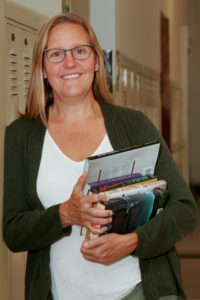This post was written by NCTE member Mollie V. Blackburn.
We are in a time when federal and, in many places, local institutional supports for minoritized students are being withdrawn and, further, obstacles to the academic and social success of these students are being increased by these same institutions.
Being in this time is challenging. Teaching, however, is grueling. I have had the privilege, though, of learning about how some deeply invested teachers manage to keep teaching in ways that responsively and respectfully educate and advocate for those students who are most vulnerable in this time. And I have tried my best to keep up with them, particularly in 2015 and 2016, when I had the opportunity to teach a high school LGBTQ literature course.
With them, I have learned the importance of knowing why you do what you do, beyond policies, at various levels, and including federal guidelines, which do not always best serve all students.
So, for example, if you know that it is best for trans students to be able to use the bathrooms that align with their gender (see the GLSEN Transgender Model District Policy), even though this is not supported by federal guidelines any more, you may work very hard to make this district or school policy. In the interim, you may work with impacted students to make a plan for their day that allows them to use single-stall restrooms in your school.
If you know your mandated curriculum fails to include positive representations of LGBTQ people, while you simultaneously know that such curricular representation increases the possibilities for academic success for LGBTQ students (see the GLSEN 2015 National School Climate Survey – Executive Summary), you may work to bring in complementary texts that provide such representation.
You may only be prepared to have these texts among the books on your shelf, but, ideally, you will take the risk, rather than requiring your students to do so, to use these texts among the others you are reading for class.
So, if your elementary students are exploring the concept of families, you might read Patricia Polacco’s In Our Mother’s House. If your middle schoolers are talking about bullying, then you might have them watch Groundspark’s Let’s Get Real, which talks about bullying and includes homophobic bullying in the larger discussion. If your high school students are reading Elie Wiesel’s Night, they might also read and discuss Leslea Newman’s “A Letter to Harvey Milk.”
I know, though, that no one person can know it all, not all the policies, guidelines, books, films, anything. That’s why it’s important to find your people—that is, teachers who get the difference between policies and ethics and know where they stand. Find them; connect with them.
Together you must challenge and support one another to be the best teachers you can be, for all students, but with special attention to those who are made most vulnerable, in this time.

Mollie Blackburn is a professor in the Department of Teaching and Learning at the Ohio State University. Her research focuses on literacy, language, and social change, with particular attention to lesbian, gay, bisexual, transgender, queer, and questioning (LGBTQ) youth and the teachers who serve them. She is the author of Interrupting Hate: Homophobia in Schools and what Literacy can do about it, a co-author of Stepping Up!: Teachers Advocating for Sexual and Gender Diversity in Schools, and a co-editor of Acting Out!: Combating Homophobia through Teacher Activism. She has received the Inglis Award from WILLA (now GALA) for her work in the areas of gender, sexuality, sexual orientation, and young people.
Visit the Facebook page of GALA: Gender and Literacy Assembly of NCTE.

